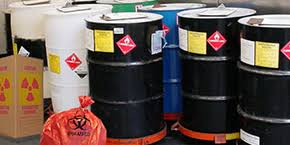Hazardous waste
The purpose of this page is to bring together information in relation to hazardous waste. It includes information on what it is, links to the University’s policy on hazardous waste and also guidance in relation to the segregation and disposal of hazardous waste.
What is hazardous waste?
- Some types of waste are harmful to human health or to the
 environment, either immediately or over an extended period of time. This is called hazardous waste. Many items are classed as hazardous waste because of the substances they contain and as such require appropriate disposal, separate from normal waste disposal routes.
environment, either immediately or over an extended period of time. This is called hazardous waste. Many items are classed as hazardous waste because of the substances they contain and as such require appropriate disposal, separate from normal waste disposal routes.
- Hazardous waste comes in many different shapes and forms, and includes materials and equipment commonly found in offices, as well as in laboratories, workshops and on farms.
- Some typical examples of hazardous waste that can be found across the University include:
| Liquid waste | Solid waste | Other |
|---|
- Laboratory smalls (liquids)
- Low hazard aqueous waste
- Mixed waste solvents
- Organic solvent waste
- Waste oils
|
- Biological waste
- Clinical waste
- Contaminated packaging
- Laboratory 'smalls' solids
- Sharps
|
- Asbestos
- Batteries
- Fridges and freezers
- Fluorescent light tubes
- WEEE waste
|
The University produces numerous types of hazardous waste and has a 'duty of care' to make sure it's disposed of properly. Currently, individual Schools/Faculties make their own disposal arrangements for most hazardous wastes. The classification of many hazardous wastes can be complex but the Environment Agency has various guidance available to help. More detailed guidance on hazardous waste, known as WM3 technical guidance, is available here.
It is a criminal offence to dispose of any hazardous waste inappropriately. The above items should never be disposed of in the general waste otherwise the University, or the individual involved, may be subject to prosecution by the Environment Agency.
University's hazardous waste policy
- Detail on the University’s hazardous waste policy, including responsibilities, can be found here.
Emergency Spills Response Procedure
- A procedure on how to deal with spills in the external campus environmental can be found here.
Further support
- Expert advice on classification, assignment, packaging and transport of hazardous waste can be obtained from the University’s Dangerous Goods Safety Adviser for hazardous waste. Please email the Sustainability team within the Estate Office for further details sustainability@nottingham.ac.uk